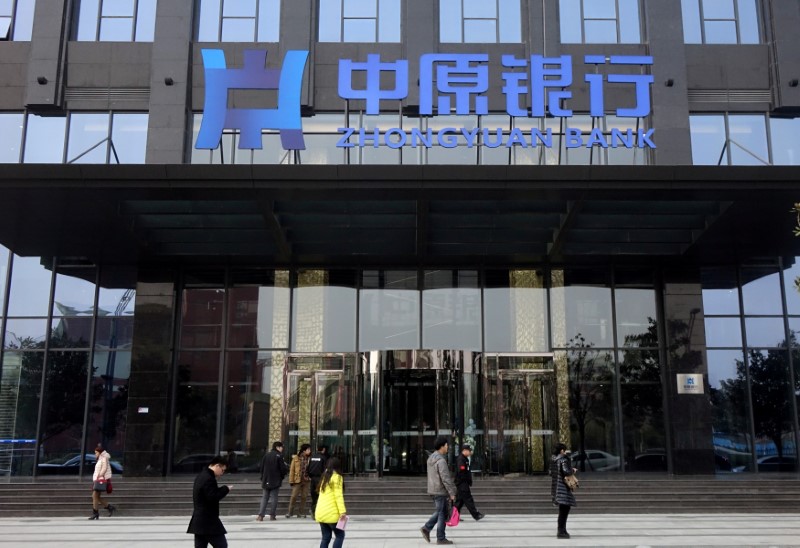By Elzio Barreto
HONG KONG (Reuters) - Smaller Chinese banks that have listed in Hong Kong in the past year are badly underperforming the rest of the market – and their exposure to China's shadow banking system may be a major reason.
The lack of appetite for the initial public offerings is likely to make it more difficult for the dozens of smaller Chinese banks who would also like to list, bankers say. Only if they are able to sell a big portion of their shares to so-called cornerstone investors – often shareholders and companies with which they already have financial ties – will they find it easy to go public.
Mainstream investors – whether retail or institutional – are wary of the levels of disclosure from the banks that have listed in Hong Kong in the past year, bankers said. They say the risks of the banks' involvement in selling and buying so-called wealth management products in mainland China are unclear.
Of the six banks that have listed in Hong Kong in the past 16 months, all are underperforming the benchmark Hang Seng index (HSI). From their IPO prices, their shares have moved between a gain of 7.5 percent, in the case of Jilin Jiutai Rural Commercial Bank (HK:6122), to a decline of 21.5 percent for Bank of Tianjin (HK:1578). The Hang Seng Index is up 20 percent since Jilin Jiutai went public in January and has gained 35.3 percent since Bank of Tianjin's debut in March 2016. [L3N1KG21J]
"You really find it difficult to find a catalyst at this moment to invest into the banks," said Arthur Kwong, head of Asia Pacific Equities at BNP Paribas (PA:BNPP) Asset Management in Hong Kong. "It's not that transparent what kind of investments they are making."
Those concerns may dampen demand for upcoming deals expected from Bank of Gansu, China Bohai Bank Co [BOHAI.UL] and Bank of Jiujiang. The three banks to list so far this year - Jilin Jiutai, Guangzhou Rural Commercial Bank and (HK:1551) and Zhongyuan Bank (HK:1216) - were all priced towards the bottom of their indicative ranges, indicating that investor sentiment remains weak.
Hong Kong's Securities and Futures Commission declined to comment about the banks' level of disclosure. The Hong Kong stock exchange said it would be more appropriate to ask China's banking regulator any questions about the banks.
FUNDING-LIABILITY MISMATCHES
One of the biggest concerns is that some of the smaller banks are boosting profits by tapping short term funds in the interbank market or by issuing wealth management products to invest into structured products or securities with an obscure setup, creating the risk of funding mismatches and a liquidity crunch as their assets tend to be much longer term than the liabilities.
Chinese authorities have been seeking to reign in the shadow banking sector and the financial institutions' off-balance sheet business this year as they seeks to prevent China's growing debt problem from creating major financial risks.
"The market, especially institutional investors, still has the worry about non-performing loans inside the banks," said Chris Choy, chief investment officer at Hong Kong fund firm Quam Asset Management, adding that recent measures to control trust and wealth management products signal further pain to come for the banks.
Data from PwC suggests regional banks – in a bid to keep profit growth at maximum speed – have become some of the largest investors in shadow banking products, with investment portfolios in those products accounting for as much as 46 percent of city commercial banks' assets at the end of 2016, while loans to customers made up 37 percent of assets.
"There's a lot of focus from international investors on that. There's no doubt there's a transparency issue," said the head of equity capital markets (ECM) at a global investment bank in Hong Kong that has worked on several financial listings in the city. He declined to be named because of the confidentiality of his ties with the banks.
Issuance of negotiable certificates of deposit (NCD), which many banks use to buy those investment products, reached a record 5 trillion yuan ($735.3 billion) in the first quarter of this year, according to Moody's Investors Service.
Those investments can include anything from relatively simple bonds and debt securities issued by other banks, to opaque trust fund plans and wealth management products, but the multiple layers in some of those products means their true risk is not easy to assess. "Somewhere along the way, some of the things that may need to be done, like provision for asset losses, might not always be done timely at each level. That would be the potential risk inherent in the system," said Vincent Yao, PwC China Financial Service Partner.
Zhongyuan Bank, the largest city commercial bank in the central Henan Province, is one example. The lender, which priced its $1 billion IPO near the bottom of expectations on July 19, has seen its securities investments soar almost six-fold between 2014 to 2016, accounting for 42 percent of total assets, while loans now only make up 37 percent of assets.
Cornerstone investors bought about half of Zhongyuan Bank's offering.
Zhongyuan Bank didn't respond to a Reuters request for comment on their investments and performance since going public.
(For graphic on Jilin Jiutai Rural Commercial Bank vs Hang Seng Index, click http://reut.rs/2h22ksc)
(For graphic on China Zheshang Bank vs Hang Seng Index, click http://reut.rs/2h1MTAk)

(For graphic on Bank of Tianjin vs Hang Seng Index, click http://reut.rs/2eN4wmN)